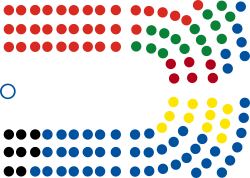2023–2024
In December 2023, the Government repealed several of the previous Labour Government's legislation and policies including the Reserve Bank of New Zealand's dual mandate, the Fair Pay Agreements Act 2022, the Clean Car Discount programme, the Natural and Built Environment Act 2023 and the Spatial Planning Act 2023. [19] [20] [21] [22] On 21 December, the Government passed legislation reinstating 90-day work trials. [23] In February 2024, the Government repealed the Three Waters reform programme, Smokefree Environments and Regulated Products (Smoked Tobacco) Amendment Act 2022 and disestablished Te Aka Whai Ora (the Māori Health Authority) under urgency. [24] [25] [26]
In late March 2024, the Government passed major tax legislation restoring interest deductibility for residential investment property, reducing the bright-line test for residential property to two years, and eliminating depreciation deductions for commercial and industrial buildings. [27] The Government also passed legislation requiring electric cars and plug-in hybrids to pay road user charges. [28] In mid April 2024, the Government passed the legislation allowing 11 pseudoephedrine cold and flu medicines to be sold without prescriptions from June 2024. [29]
In late July 2024, the Government passed legislation reinstating the referendum requirement for Māori wards and constituencies in local councils. Councils that had previously established a Māori ward without a referendum are now required to hold a binding poll alongside the 2025 New Zealand local elections or to disestablish them. [30] In late August 2024, the Government passed legislation requiring local councils to develop plans for delivering drinking water, wastewater and stormwater services as part of its "Local Water Done Well" programme. [31]
In September 2024, Parliament passed a private member's bill amending the Fair Trading Act 1986 to ensure that gift cards have a minimum expiry date of three years from their initial purchase. The bill was supported by all parties except ACT. [32] In mid October 2024, Parliament passed Deborah Russell's private member's bill exempting victims of domestic violence from waiting a mandatory two years to seek a divorce. [33] In late October 2024, National-led government passed the legislation easing the "regulatory burden" on the country's farming, mining and other primary industries. [34] In late November 2024, Parliament with cross-party support passed legislation restoring New Zealand citizenship to people born in Samoa between 1924 and 1949, who had been deprived of New Zealand citizenship in 1982. [35]
On 12 December 2024, Parliament passed the government's legislation introducing its pet bonds for tenants and reinstating 90 day no-cause evictions. [36] On 13 December, Parliament passed the government's legislation reinstating three-strikes laws. [37] On 17 December, the Government's contentious Fast-track Approvals Act 2024 passed into law. [38]
2025
On 30 January 2025, Parliament passed the Taranaki Maunga Collective Redress Bill, which conferred legal personhood on Mount Taranaki. The New Zealand Crown also apologised to eight Māori iwi for confiscating Mount Taranaki and 1.2 million acres of Māori lands in the Taranaki region. In addition, Mount Egmont would cease to be an official name for Mt Taranaki. [39]
On 12 March, Parliament passed Labour MP Camilla Belich's Crimes (Theft By Employer) Amendment Bill, clarifying that an employer withholding an employee's wages is theft. While the bill was opposed by National and ACT (60 votes), it passed with the support of the Labour, Green, Māori and New Zealand First parties (63 votes). The bill received royal assent on 13 March. [40]
On 7 May, Parliament passed the Equal Pay Amendment Act 2025 under urgency, raising the threshold for making pay equity claims. As a result, 33 claims representing thousands of workers have to be dropped and refiled. The bill was supported by the governing coalition but opposed by all opposition parties. [41]
On 26 June, Parliament passed legislation designating the Independent Children's Monitor as a stand-alone independent Crown entity, disestablishing the Children and Young People's Commission and reinstating the Children's Commissioner; effective 1 August 2025. The bill was supported by all parties except Te Pāti Māori. [42] On 31 July, Parliament passed legislation repealing a 2018 law limiting new oil and gas exploration permits off the coast of Taranaki along party lines. [43]
On 19 August, the Government passed two laws, the Local Government (Water Services) Bill and the Local Government (Water Services) (Repeals and Amendments) Bill, entrenching its Local Water Done Well framework. [44] On 20 August, Parliament passed Labour MP Camilla Belich's bill banning employers from imposing gag orders on workers talking about their salaries passed into law with the support of the Green, Māori, and National parties. That same day, Labour MP Tracey McLellan's bill extending the range of protections for those giving evidence of sexual assaults or family harm in the Family Court passed into law with unanimous support. [45]
On 17 September, Parliament passed urgent legislation preventing convicted abusers from adopting children from other countries. [46] On 14 October, Parliament passed legislation allowing radio and television stations to broadcast advertisements on Christmas Day, Good Friday, Easter Sunday and Anzac Day. The legislation was supported by the National, Labour and ACT parties but was opposed by the Greens, New Zealand First and Te Pāti Māori. [47] On 22 October, Parliament passed the government's legislation limiting the threshold for Māori foreshore and seabed claims. Opposition parties vowed to repeal the legislation if they formed the next government. [48]
On 5 November, Parliament passed legislation formalizing a Treaty of Waitangi settlement with Ngāti Pāoa. The settlement includes NZ$23.5 million in financial compensation, recognising 12 "culturally significant" sites, and a formal Crown apology for historical land alienation. [49] On 13 November, ACT leader and Deputy Prime Minister David Seymour's contentious Regulatory Standards Act 2025 passed its third reading in Parliament, becoming law. [50]
On 11 December, Parliament passed two urgent government laws delaying a ban on farrowing crates by ten years and legislation amending the Fast-track Approvals Act 2024. [51] [52]










































































































































